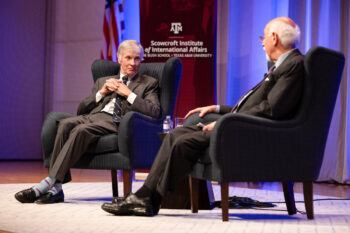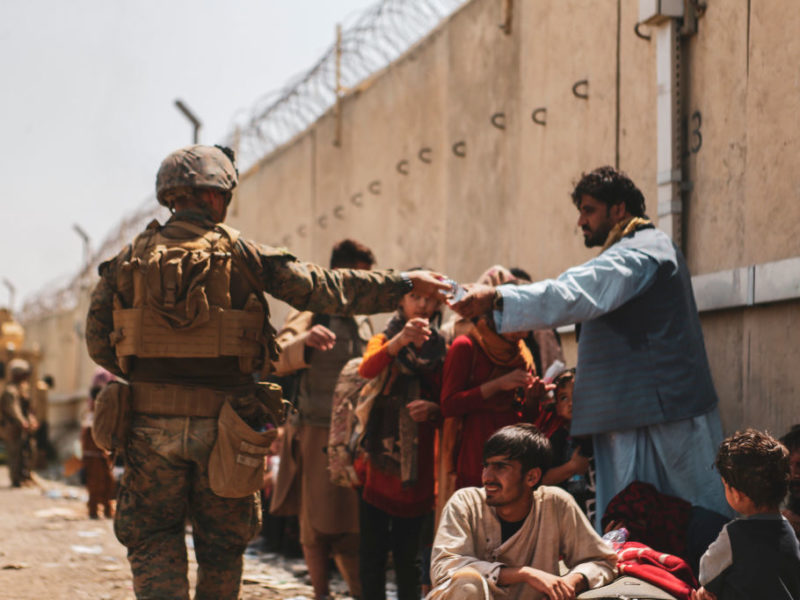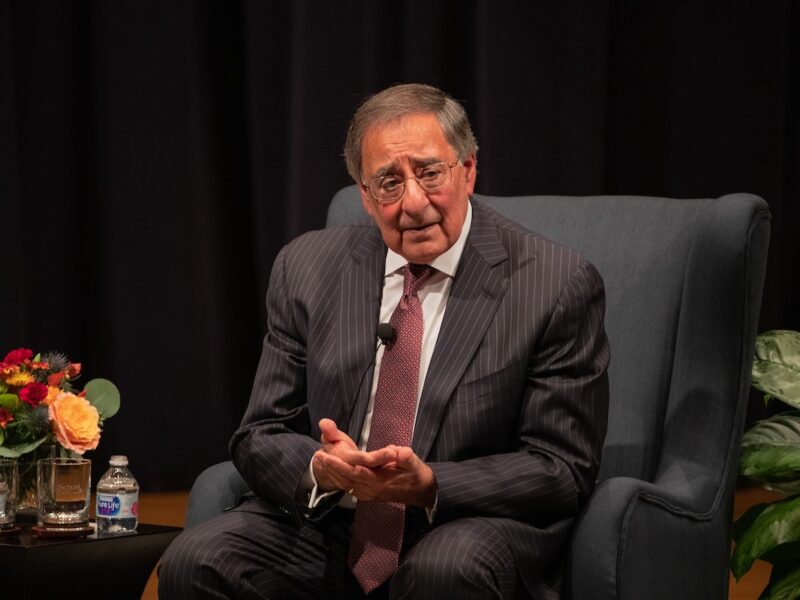Israel-Hamas War: Veteran Diplomat Discusses How We Got Here

Despite attempts by successive presidential administrations to pivot their attention to other parts of the world, the Middle East is once again at the top of the U.S. foreign policy agenda following Hamas’ Oct. 7 attack on Israel, says one career diplomat.
The region “is once again on fire,” said Ryan Crocker, former dean of the Bush School of Government and Public Service during a recent visit to Texas A&M. The former ambassador to Afghanistan, Iraq, Pakistan, Syria, Kuwait and Lebanon gave an assessment of the ongoing conflict in Gaza. The situation is a reminder that the United States is “still the greatest power on Earth, and we can do more than one thing at once,” he said.
Crocker, a nonresident senior fellow at the Carnegie Endowment for International Peace, has been a vocal critic of the 2021 withdrawal of U.S. forces from Afghanistan. He restated during his talk hosted by the Scowcroft Institute of International Affairs that while he still believes the decision will be remembered as “one of the colossal strategic misjudgments in modern history,” he gives the Biden administration credit for its handling of the conflict in Gaza.
“This administration is doing about as best as can be done, and I admire them for sticking to a consistent and principled position, even though it is costing them politically in an election year,” Crocker said.
President Joe Biden made the correct decision in the immediate aftermath of Oct. 7 in being consistent in both showing support for Israel and calling for restraint in Israel’s actions, he said. But Crocker said the situation has now reached the “red line” drawn by the Biden administration regarding the threatened invasion of the city of Rafah on the southern border of the Gaza Strip.
“What we have seen so far in the way of Israeli planning does not inspire any confidence that they really have a viable plan to look after the welfare of the many, many hundreds of thousands of civilians sheltering in Gaza,” he said.
Crocker said it can be difficult to fully understand the impact of Hamas’ Oct. 7 attack on Israel. He points out that 1,200 people were killed in one day. By contrast, Israel lost 1,100 IDF troops during its 18-year occupation of Lebanon. That loss had a “stunning impact,” he said, and public opinion polling has shown strong Israeli support for military action in Gaza.
So in addition to taking a “moral stance” in the immediate aftermath of the attack, the Biden administration’s support of Israel helps keep the support of securing a two-state solution alive.
“With the red line of Rafah yet to be fully understood and dealt with, had we shifted position before this, it would have driven not just the current Israeli government, but the Israeli public as a whole, in the wrong direction, to say that we are really alone in the world and only ourselves can we look to,” Crocker said.
It also illustrates what Crocker calls a “central fact” of the Middle East: there are no good options, only “bad” and “worse.” He commended the Biden administration for setting a policy and staying with it, saying consistency has been a problem in American foreign policy over the years.
Looking more broadly at the region, Crocker said he worries about the potential unintended consequences of Israeli action in Gaza, recalling witnessing the 1982 Israeli invasion of Lebanon in response to a series of attacks by the Palestine Liberation Organization (PLO). While the PLO state-within-a-state was dismantled, the vacuum in southern Lebanon was filled by Hezbollah, Crocker said.
In the case of the current conflict, Crocker said while it may be the case that Hamas is “definitively defeated” by political and military force, another “-ism” will most likely rise in its place.
“That long-term estimation of consequences of actions is so important and so often missing from the immediacy of the moment and the crisis of the hour,” Crocker said.
The Middle East is a complicated region that demands the U.S.’s constant, sustained attention, he said. While it’s impossible to know where the crisis is headed, Crocker said he had more positive feelings when thinking about the future after meeting with students at the Bush School earlier that day.
“I’ve taught at a few other institutions on international affairs over the years, and I got questions today that students of mine at Princeton or Yale couldn’t even being to conceive of asking,” he said. “These are students who are in the best tradition of the former president… They know what they want to do, they want to serve our great nation. They’re looking for the education and the tools, the guidance, to help them do than in a truly effective way.”





